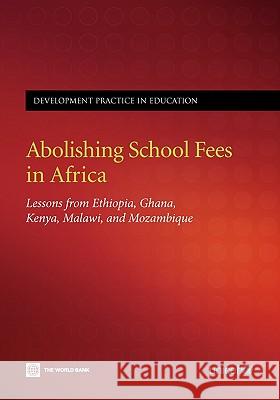Abolishing School Fees in Africa: Lessons from Ethiopia, Ghana, Kenya, Malawi, and Mozambique » książka
Abolishing School Fees in Africa: Lessons from Ethiopia, Ghana, Kenya, Malawi, and Mozambique
ISBN-13: 9780821375402 / Angielski / Miękka / 2009 / 251 str.
Why abolish school fees in Africa? The answer seems obvious: to achieve the right to education for all and thus promote equitable participation in economic growth and political action. However, moving from a system based on user fees, which stifled enrollment of the poorest and most vulnerable children, to one of free basic education for everyone has hidden costs if the effort is unplanned or underplanned. The immediate and dramatic influx of students can overburden the education system and compromise quality because of a lack of qualified teachers, an increase in class size, and the loss of school-level funding. Such a result benefits no one. If the elimination of school fees is to make a positive and sustainable impact on school access and learning outcomes, then it must be carefully planned, widely negotiated, and financially supported. Toward these ends, the School Fee Abolition Initiative (SFAI) was launched jointly by the United Nations Children's Fund (UNICEF) and the World Bank in 2005. The initiative promotes access to quality basic education worldwide through three specific goals: constructing a knowledge base (database and analysis of experiences), providing assistance (technical and financial) to countries developing a national education plan, and building the partnerships that will ensure success. 'Abolishing School Fees in Africa' is the product of a SFAI workshop, "School Fee Abolition: Building on What We Know and Defining Sustained Support," held in Kenya in 2006. The book begins with a comparative overview of the processes, challenges, and lessons learned by five countries that had already abolished school fees: Ethiopia, Ghana, Kenya, Malawi, and Mozambique. The subsequent chapters delineate the actual experiences of each of the countries in planning and implementing their policies. This volume will be invaluable to national policy makers and their development partners--civil society, the private sector, development agencies--in eff orts to open access to a quality basic education to all.











